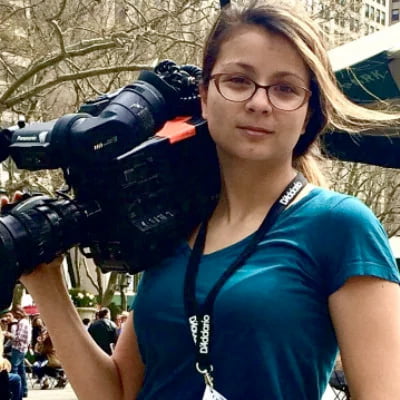Emmy award winner. Bestselling author. He has a star on the Hollywood Walk of Fame and two syndicated shows. Not to mention he’s run for Governor and President. Renaissance man Larry Elder is now nominated for the Radio Hall of Fame. In his own words, Elder believes “I’m just getting started.”
The Los Angeles native attended Brown University before heading to the University of Michigan for his law degree. He practiced for three years before opening a headhunting firm for lawyers. Throughout the years, Elder always had one dream. “I always wanted to be a writer and still consider myself primarily to be a writer.”
There was one thing that stopped him from writing early on in his career. “I always wanted to eat, and I knew that going out and trying to become a writer full time is a struggle, and I didn’t want to struggle like that.”
After a few years, he began writing op-ed pieces part-time. “I was living in Cleveland at the time, and the large newspapers were the Cleveland Plain Dealer and the Akron Beacon Journal. So I wrote an article and I sent it to them.” The papers said thanks, but no thanks. Determined, Elder wrote a second article, which also got a pass, but his third? “That one got published.”
“The article was about how, in my opinion, racism was no longer a major impediment to hold black people back. Not that racism was gone — it will never be gone — but that if you’re willing to work hard, invest in yourself, and stay focused, you’ll be just fine in America,” Elder recalled.
After his piece was published he got a call from a radio show and was invited to be on. Elder was only booked for one segment but instead, “I was on for an hour and every [commercial break] was always, ‘Can you stay longer?’”
His piece, however, was not well received. “I got all sorts of phone calls. Every single one of them was negative. Cleveland is about 50% black at the time. Almost every single call, it was a black person and they were not happy.”
Elder was called awful names like, “An Uncle Tom, a sellout, a bootlegging Uncle Tom, the anti-Christ. And I was called the word that you really want to use when you want to hurt a black person. I was called Republican.”
When the show was over, Elder said to himself, “That’s the longest hour of my life. I’ll never do that again.” Then his phone rang.
“It’s the station manager and he said, ‘I heard today, you were amazing.’ I said, ‘I was on my God.’ He said ‘You were funny, you have a good speaking voice, you took a difficult position. You defended them without losing your temper or your sense of humor. Have you ever thought about doing a talk radio?’ I said ‘No.’ He said, ‘I’ve got a guy going on vacation. Will you sit in for him?’ I said, ‘No.’”
The station manager asked Elder to talk to his then-wife about it, “She said, ‘What do you think of talk radio?’ I said, ‘No, nothing about it.’ I knew who Howard Stern was … but I never listen to them regularly. As far as I’m concerned, talk radio? Shallow, glib, and stupid. She said ‘It is. You’d be good at it.’”
After sitting in on the show for 20 minutes, Elder decided this was what he wanted to do. “So I took the best 20 minutes of that week. Five shows, I think three hours, three hours long each each day. And I made them into a cassette tape.” He sent the tape out to stations in Los Angeles and never heard back from anyone. So, “I forgot about it.”
Then he met Dennis Prager while doing a show, who invited him to visit the next time he was in Los Angeles. Prager was also Elder’s mother’s favorite talk radio host (at the time). So when she found out the next time Elder flew home she asked, “Did you call Dennis? I said yes. And she said, ‘What happened?’ ‘He didn’t return my phone call.’ She said, ‘Call him again right now. Put the phone in front of me. I call him.’ [Prager] answered. He had me on that night.”
This is how Larry Elder became a conservative radio titan.
Over the years Elder has been called countless names but it doesn’t bother him. One unexpected conversation with a listener sticks out to him, “I walk into the restaurant and there are two black guys sitting on a brick wall smoking cigarettes. And one of them said, ‘Larry Elder! I love you and I hate you. Come over here.’”
The man told Elder,“‘I’ve been listening to you about three, four months now. First time I heard you, I hated your guts. Little by little I said to myself ‘You ain’t doing nothing but telling people to work hard to stop whining.’ You are like castor oil. It don’t taste good going down, but it’s good for you. Keep it up.’ And, at that point, I realized I was connecting with people.” Today, when people call Elder names, he believes it because “They’re out of ammo.”
The “thrill” of his career came sometime later while giving a speech at the Ronald Reagan Library. “My parents were in the audience and I mentioned in the speech briefly and they interrupted my speech and gave my parents a standing ovation. I never will forget that.”
Elder said his relationship with his father inspired the best story he’s ever told, “Dear Father, Dear Son: Two lives… Eight Hours.” After an argument in his father’s cafe then 15-year-old Larry Elder did not speak with his dad for 10 years. It wasn’t until he was 25 when they spoke again.
After unexpectedly showing up at his dad’s cafe, the younger Elder, “Spoke to him for 20 minutes, non-stop. I told him every whipping he ever gave me, every time he ever said anything that insulted me. I told him everything I could think of. After 20 or 25 minutes, I was done. I had no more ammo and my dad said, ‘Is that it? You didn’t speak to me for ten years because of that? Let me tell you about my father.’ For the first time, I saw my father cry.”
The book became a New York Times bestseller.
“I get letters to this day from people all over the world telling me the book made them reconnect with their parents, with their father, made them a better father. I know it’s changed the way a lot of people have felt about their own fathers,” Elder said.
His advice for those looking to follow in his footsteps is simple. “Stand your ground and recognize that you’re gonna lose friends. And I put friends in quotes because they divorce you. Because of your ideology, because you’re telling the truth. They really weren’t friends anyway.” He later added, “I think ultimately, all we can do is tell the truth and hope that common sense prevails.”

Krystina Alarcon Carroll is a news media columnist and features writer for Barrett Media. She has experience in almost every facet of the industry including: digital and print news; live, streamed, and syndicated TV; documentary and film productions. Her prior employers have included NY1 and Fox News Digital and the Law & Crime Network. You can find Krystina on X (formerly twitter) @KrystinaAlaCarr.









